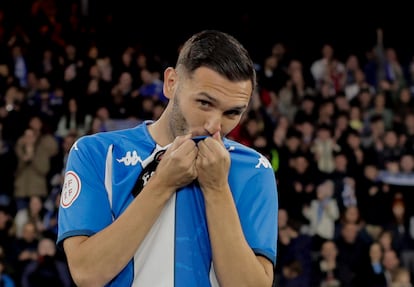Lucas Pérez: Return to the wound

Text in which the author advocates ideas and draws conclusions based on his or her interpretation of facts and data.

The idea of returning can be terrifying. Memories turned into fiction after decades away from home. Into lies. The smell of food condensed into a story that you tell your children and friends, more and more, blended in the blender of the phone to unite them to a life that separates you. Distance, that is the good part, also provides a fabulous varnish to memory. And to ourselves, who look better and better out of context: footballers, expatriated managers, travelers and correspondents who no longer have any role in an editorial office. There is no better makeup than the kilometers, even if sometimes you have to return and dig into the wound of your life. But O'Neno's story was going to be different.
Two years ago, a lightning bolt struck football's greedy algorithm. Lucas Pérez, then a Cádiz player, paid 500,000 euros out of his own pocket to return to Deportivo and try to help the Galician team, which was in the First RFEF, return to the Second Division. And so he did. "I'm not talking about money, I wanted to go home," he said at his presentation. The team of his life, yes. But a club where he was going to receive a lower salary. A short circuit in the business. It happened while talented countrymen like Gabri Veiga were leaving for Saudi Arabia, attracted by the stench of oil. And he arrived, opened his wallet and took out what was needed to pay his transfer fee and give his people back their Sundays. He didn't count on the fact that as soon as he felt his pocket, all the memories he had buried would pounce on him.
Coming back after a certain amount of time, beyond the money it costs, as O'Neno's case shows, can also be extremely painful. After Arsenal, Westham, Alavés, Elche, Cádiz and his return to Depor, the player is now off to PSV Eindhoven (1,700 kilometres by car due to his fear of flying), after explaining how badly he felt about returning, reconnecting with what he had left behind (and the bad rapport with the club).
Lucas Pérez, now 37, was abandoned by his parents when he was only two, he told El partidazo on Monday , in one of those rare and valuable interviews that footballers never give. They left him in a children's home, an orphanage. And from there he was taken in by his grandparents, who raised him. “A burofax arrived at the club with a complaint from my father,” he said, suddenly changing the pace of the interview. Because it turns out that his father is now demanding maintenance for the rest of his life. The same thing his mother had already done when he signed for Arsenal and smelled the pounds from Coruña, he said with some tears. “I have an open wound. But I want to tell it; because when I returned to Deportivo it was to stay, not to leave.”
Lucas Pérez returned to Coruña because it was his home, and he has had to leave for the same reason. “I left because of my father. The city is very small. I have met him several times, and it is not pleasant.” This time he will live his memories from Holland. He already has an apartment, three rooms, 2,300 euros. Furnished, you never know if it will last for a long time. He has put some distance between himself and me again. And sometimes it is better that way.

Born in Barcelona, he learned his trade in the Madrid section of EL PAÍS. He worked in Culture and Reports, covered Islamist attacks in France and the Fukushima catastrophe. He was a correspondent for seven years in Italy and the Vatican, where he saw five governments fall and two popes live together. Correspondent in Paris. On Tuesdays he writes a column in Sports.
EL PAÍS






